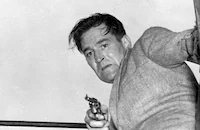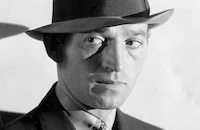Baby Face Nelson
Brief Synopsis
Cast & Crew
Don Siegel
Mickey Rooney
Carolyn Jones
Sir Cedric Hardwicke
Leo Gordon
Anthony Caruso
Film Details
Technical Specs

Synopsis
In Chicago during 1933, robber Lester M. Gillis is released from Joliet prison and plans to go straight. He is immediately coerced back into a life of crime, however, by gangster Lou Rocca, who has arranged for Gillis' release in order to employ him as a henchman. Although Gillis refuses his first assignment, the murder of a labor organizer, he accepts a job more to his liking, the roughing up of some policemen refusing to join Rocca's racket. Before starting work, Gillis visits his girl friend, Sue Nelson, to set up a date for later that night. Noting a newspaper story that the labor organizer has been killed, Gillis is pleased that he has avoided the job. As he awaits Sue in his apartment that evening, however, police barge in and, upon searching the toilet, find a gun taped to the underside of the tank. Rocca has framed him for the murder and Gillis is soon back in jail, where he formulates an escape plan. While he is being transported to another prison, he manages to beat up the guard and jump into Sue's waiting getaway car. Although Gillis warns Sue that he plans to kill Rocca, she refuses to leave him, despite the danger. They return to Chicago, where Gillis shoots Rocca and two henchmen in cold blood and then, exhilarated by his success, holds up a pharmacist to obtain illegal liquor. The pharmacist shoots back, however, and hits Gillis in the shoulder, forcing the couple to seek treatment from the seedy, alcoholic Doc Saunders. As Gillis recovers, he meets fellow patient John Dillinger, who has received plastic surgery to alter his features and fingerprints. Dillinger nicknames the young-looking Gillis, who has taken Sue's last name as an alias, "Baby Face." Soon, Baby Face is working with Dillinger's gang robbing banks, and his eagerness to murder anyone in his way earns him the second slot, after Dillinger, on the FBI's Most Wanted list. As federal agent Markie trails the gang, Baby Face chafes under Dillinger's leadership. When Dillinger orders him to hide out at a lodge, Baby Face complies but secretly sets up another robbery, with the help of Fatso Nagel. The agents have followed Nagel, however, and the gang barely manages to avoid arrest. During the escape, Baby Face insists on stopping the car to shoot the lodge proprietor and several agents. Their car later runs out of gas and Baby Face orders Sue to entice the driver of the next car into stopping to help them. When the kindly driver recognizes Baby Face, the gangster kills him, to Sue's horror. Soon after, Dillinger is murdered and Baby Face takes control of the gang, who cower at his ruthlessness. Now the number one Most Wanted criminal in America, Baby Face has his fingerprints removed by Saunders, but after the doctor botches the operation, the gangster kills him. Baby Face continues his bank-robbing spree, killing many hostages along the way but allowing one, a bank manager who happens to be of small stature, to live. Markie then arrests Nagel and forces him to set up a fake robbery in which the agents will be able to capture Baby Face. The gangster guesses the ploy, however, and after sneaking the gang into the bank disguised as a guards, locks his accomplices in the vault and takes off with the stolen money. He and Sue hide out at the lodge, assuming no one will look for them there. One day, two young boys wander onto the property, and Sue watches as Baby Face trains his gunsight on them. When the boys turn to leave, Baby Face lowers his gun, and later Sue asks him to lie to her that he would not have killed them. Soon, Markie learns about the hideout, and Baby Face and Sue once again flee. They are trapped by a roadblock, however, and although they try to crash through it, the agents shoot their car's tires, forcing the couple to run. Baby Face is shot multiple times, and struggles, with Sue's help, into a graveyard. There, he begs Sue to "finish him off," and when she refuses, tells her over and over that he would have shot the boys. Finally, Sue shoots her lover, then collapses in grief.

Director

Don Siegel
Cast

Mickey Rooney

Carolyn Jones

Sir Cedric Hardwicke
Leo Gordon

Anthony Caruso
Jack Elam

John Hoyt

Ted De Corsia

Elisha Cook Jr.
Robert Osterloh
Thayer David
Dabbs Greer

George E. Stone
Lisa Davis
Emile Meyer
Dan Terranova
Murray Alper
Harry Antrim
Tom Fadden
Duke Mitchell
Chris Dark
Dick Crockett
Paul Baxley
Ken Patterson
Sol Gorss
Gil Perkins
Hubie Kerns
Crew
Robert Adler
Van Alexander
Leon Barsha
Paul Baxley
Sam Bozaiano
Dick Crockett
Red Doff
Wayne B. Fury
Sol Gorss
Johnny Greenwald
Joe Hicks
Joseph Kish
Harold Lewis
Daniel Mainwaring
John J. Malone
David Milton
Hal Mohr
Ted Mossman
B. Roberts
Byron Roberts
Mickey Rooney
Irving Shulman
Irving Shulman
Harry Slott
Harold Spina
Harry Thomas
Guy Way
Al Zimbalist
Donald Zimbalist

Film Details
Technical Specs

Quotes
Trivia
Notes
Although the onscreen credits list the production company as Fryman-ZS Prodcutions, the copyright claimant is listed as F-ZS Productions. A written and spoken foreword states: "A tribute to the FBI. Under J. Edgar Hoover, its director for thirty-five years, the Federal Bureau of Investigation has been forged into America's most formidable weapon against all crimes. To these special agents, living and killed in the line of duty, to these men who sacrifice themselves to help smash the citadels of crime, we respectfully dedicate this motion picture!" Before the opening credits, voice-over narration describes the 1930s era and the criminals it produced.
According to a January 16, 1950 Hollywood Reporter news item, producer Al Zimbalist and Herb Golden co-wrote the original story for Baby Face Nelson. That item stated that Jack Bernhard had purchased the story and planned personally to adapt it into a screenplay and direct it as an "exploitation special." In December 1953, Daily Variety reported that Zimbalist and Jack Rabin had signed a two-picture deal with Carl Dudley, the second film of which would be Baby Face Nelson. At that time, the producers planned to shoot the picture in Vistarama and were hoping to cast Frank Sinatra as the lead. However, neither Golden, Rabin or Dudley are credited in the final film, and Golden's contribution to the screenplay, if any, has not been confirmed.
Although the film's onscreen writing credits read: "Screenplay by Irving Shulman and Daniel Mainwaring, story by Irving Shulman," a June 23, 1958 advertisement placed by Fryman-ZS Productions in Hollywood Reporter reads: "Through no fault of The Writers Guild of America, West, the writing credits on Baby Face Nelson are incorrect and we wish to correct them now: Screenplay by Daniel Mainwaring, story by Robert Adler."
Although, as noted by many reviewers, the basic facts of the film represent the life of ruthless 1930s gangster "Baby Face" Nelson, the majority of the picture is fictionalized. As shown in the film, the diminutive Nelson was born Lester M. Gillis in 1908, served time in Joliet for robbery and later escaped prison guards while being returned to jail. He then joined John Dillinger's gang, robbed many banks and in 1934 died of gunshot wounds inflicted by the FBI agents chasing him.
Although a July 1957 Hollywood Reporter news item adds William Phipps and Myron Healey to the cast, their appearance in the final film has not been confirmed. Modern sources add Paul Donnelly and Richard Donnelly to the cast. After the film's release, it was attacked by California Representative H. Allen Smith, who claimed that it contributed to juvenile delinquency. Despite the fact that the film was dedicated to him, Hoover also denounced the film as glorifying crime, according to a March 1958 Los Angeles Mirror article, and called for studios to practice more restraint. In a February 14, 1958 Hollywood Reporter article, Zimbalist and Red Doff, president of Mickey Rooney's Fryman Productions, countered that Allen's attack was a mere ploy for attention during his re-election campaign, and pointed out that Los Angeles FBI chief John J. Malone served as a consultant throughout the film's production. That article also noted that UA's distribution fee was 30%. A July 1970 Hollywood Reporter news item reported that the film cost $168,000 and had grossed $7 million to that date.
Daily Variety stated in September 1969 that Zimbalist planned to remake the film under his newly formed production-distribution company, American Artists Associates, and that it would star Dustin Hoffman. That film was never made. In May 1971, according to a Hollywood Reporter news item, Zimbalist was in discussions with UA about reissuing the film, which the producer owned but UA had retained distribution rights to for ten years after its original release. In June 1996, J. Hoberman of the Village Voice called Baby Face Nelson "a decade ahead of its time," pointing to its "absurdist violence and perverse love angle" as a precursor to 1967's Bonnie and Clyde (see AFI Catalog of Feature Films, 1961-70).

Miscellaneous Notes
Released in United States Fall November 1957
Released in United States Fall November 1957











